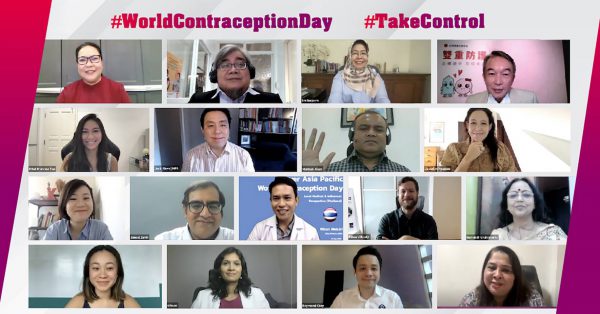Thailand, 28 September: Healthcare leaders convene to empower women across APAC to #TakeControl of their health in the digital age amidst COVID-19.

- 18 months into the pandemic, about 12 million women in Asia Pacific have seen contraceptive interruptions, leading to 1.4 million unintended pregnancies
- #TakeControl roundtable rallies key stakeholders across the region to champion women’s access to healthcare, leveraging on the key pillars of digitization, innovation and collaboration
- 16 representatives from local government, NGOs, telehealth providers and industry associations, including healthcare professionals and digital influencers, jointly pledged their commitment to continue empowering women to make informed choices about family planning and health
On the occasion of World Contraception Day (26 September), healthcare professionals, policymakers, non-governmental organizations (NGOs), telehealth providers, industry associations, and digital influencers gathered to underline their commitment to support women in taking control of their health and lives, at an Asia Pacific virtual roundtable titled #TakeControl: Shaping Digital Health for Women in the COVID Decade on September 24.




Since the beginning of the COVID-19 pandemic, millions of women have lost the ability to plan for their families and protect their health. Recognizing the urgent need for more dedicated work to secure continuity of access to healthcare, Bayer convened the virtual roundtable, in collaboration with key organizations in the region. The event unveiled the impact of COVID-19 on women’s access to healthcare, and highlighted the crucial role digital technology and collaboration play in shaping an empowered future for women’s health and family planning.
Comprised of 3 distinct expert panels, the virtual roundtable also marks the 15th anniversary of World Contraception Day with key partners such as International Planned Parenthood Federation (IPPF), Pathfinder International, the Commission on Population and Development of Philippines (POPCOM), Indonesia Midwives Association, Taiwan Associaton of Obstetrics and Gynecology (TAOG), DOC2US, Malaysian Pharmacists Society and Reach52.
The first expert panel No Woman Left Behind: COVID-19 and Unplanned Pregnancies drew attention to the urgent impact of COVID-19 on women’s access to healthcare and family planning resources, and the burden of unplanned pregnancies. Data from International Planned Parenthood states that 5,633 static and mobile clinics, as well as community-based care services, in 64 countries had already been closed by April of 2020 due to the outbreak.
“We have observed three key delays that were further aggravated by the outbreak, causing a rise in unplanned pregnancies: delays in getting family planning information to women, delays in women being able to physically access medical facilities, physicians and medication due to movement restrictions, and delays in getting health services up and running again,” shared Dr. Jameel Zamir, Director of Programmes and Performance, East South East Asia and Oceania Region (ESEAOR), Malaysia, International Planned Parenthood Federation, during the first expert panel. “On the ground, I’ve seen supply chain problems, overwhelmed health facilities, and women fearful of seeking healthcare, and when access to family planning is disrupted, entire families struggle to cope.”
With movement restrictions driving many women online for more information on healthcare and family planning, barriers such as misconceptions, and cultural and social stigma, also present challenges within these topics.
The second expert panel Step Into Her World: Engaging to Empower Online discussed key drivers of misinformation on family planning and contraception online, the need for credible voices on popular platforms and the importance of sustained dialogue.
“A lot of women in the Philippines are going online now, and I’ve seen a shift in attitude and demand for more doctors to also be online. What’s sad is that many women are online, but not the doctors,” said Dr. Michelle Dado, OBGYN & Digital Thought Leader, President of Quezon City Medical Society District IV (Philippines), at the second expert panel. “Education is the only way to encourage healthcare professionals to become more digitally savvy and translate what they do in a face-to-face consultation onto an online platform. This will help to break the endless cycle of misinformation online that may in turn lead to many young women making misinformed contraceptive choices.”
Along with flourishing online platforms, the pandemic has also accelerated healthcare digitization on an unprecedented scale. Experts on the third concluding panel The New Phygital: Innovating expanded access to women’s health shed light on how technology has been a critical enabler in the recovery and resilience of today’s health systems to expand women’s access to healthcare and family planning solutions.
“Our diverse region has one of the highest unmet needs for contraception and the lowest contraception prevalence rate, and these statistics are concerning. The good news is we are the fastest growing region digitally, and digital platforms have the potential to bring three key elements to empower women: pre- and post-contraceptive support, access to information and contraceptives, and privacy,” said Jack Shen Lim, Honorary Treasurer, Malaysian Pharmacists Society, on the third expert panel. “With everything on one platform where people can access in the comfort and privacy of their home, we can intensively increase women’s access to healthcare, family planning and contraception, and reduce the rate of unplanned pregnancies.”
At the conclusion of the virtual roundtable, all 16 panelists collectively pledged to renew their commitment to empower women to take control of their health and lives despite the pandemic. They also called for wider public support to join in the pledge and give voice to women’s health needs and empowerment.
“Safeguarding women’s health and preserving the progress made on access to contraception remain our top priority amidst COVID-19. Multi-stakeholder collaboration and digital innovation are critical in supporting family planning with undisrupted access to contraceptives, as well as increasing knowledge on women’s health, family planning and contraception,” said Dr. Shivani Kapur, Head of Medical Affairs, Pharmaceuticals Division Asia / Pacific, Bayer. “Our long-standing commitment to women’s health drives us to shape a better future – by empowering women to make informed decisions about their health and family planning, and advancing an innovative portfolio of women’s health treatments, to serve women with the right solutions, at the right time, and on the right platforms.”
Across Asia Pacific, Bayer has been collaborating with governments and organizations to introduce initiatives that promote greater contraception awareness and education. This includes partnerships with the BKKBN in Indonesia, the POPCOM in the Philippines, the Department of Health’s Bureau of Reproductive Health in Thailand, and the Family Planning and Women’s Union (FPWU) and Government Office of Family Planning (GOPFP) in Vietnam. To achieve its “Health for all, Hunger for none” vision, Bayer will continue to invest in multi-stakeholder aid programs, with the ultimate goal of providing 100 million women in low- and middle-income countries with access to modern contraception methods by 2030.
For more information on contraception awareness and education, please visit https://www.your-life.com





